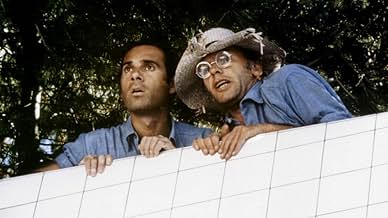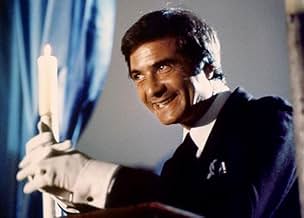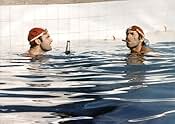A cruel fable about the relationships of a gold digger proletarian woman and her old-fashioned/has-been crooner husband, who is hired as a lifeguard by a nasty, disabled and self-sufficient ... Read allA cruel fable about the relationships of a gold digger proletarian woman and her old-fashioned/has-been crooner husband, who is hired as a lifeguard by a nasty, disabled and self-sufficient billionaire at his estate in the South of France.A cruel fable about the relationships of a gold digger proletarian woman and her old-fashioned/has-been crooner husband, who is hired as a lifeguard by a nasty, disabled and self-sufficient billionaire at his estate in the South of France.
Pierrick Mescam
- Maître Doucet
- (as Pierik Mescam)
Storyline
Did you know
Featured review
I am a fan of actor Jean-Louis Trintignant and when I think of him several different images come to my mind : I see a young charmer, I see an adult man running, I see a righteous individual standing alone against injustice. This of course is a restricted view but he did have these features in many a film. However he displays a very different side of his personality in the two movies he directed that I had not suspected and which I was pleased to discover.
Just like his first effort "Une journée bien remplie", Trintignant's second movie as a director, is a caustic black comedy, saying nay to courtesan logic, giving rise to forced laughs, pervaded by the presence of Death on the prowl.
"Le maître-nageur" (adapted from French-Armenian novelist Vahé Katcha) tells the apparently simple story of Marie (Stefania Sandrelli), an ambitious young woman who marries Marcel(Guy Marchand), a small-time crooner before pushing him into applying for a job as swimming instructor offered by pot-bellied millionaire Zopoulos (Moustache). When Marcel lands the job, he soon finds out that his task will not be to teach anyone how to swim...
Surprising as of the very beginning, the film remains unusual throughout. It abounds in unexpected scenes such as : the young couple living in an apartment leading out...into a sewer ; the employment interview for the position of swimming instructor consisting in questions like :"Can you swim?" or "If you witnessed a rich old ugly man and a good-looking poor young man, which of both would you save?" ; the chauffeur's son constantly adding sound effects to the garden of the villa...
The film can also boast an excellent cast. Guy Marchand is touching in a subdued role (whereas he is accustomed to play big mouths) ; Jean-Claude Brialy is hilarious as Logan, the spiteful but stylish butler ; as for Moustache he gives (much) flesh to the figure of the tyrannical mogul.
But where Trintignant is at his best is in the field of satire. His target is the corrupting effect of money on human soul. Are also stigmatized those, like Logan, who support these tyrants, those who by not offering enough resistance allow tyrants to go on with their exactions and those religious people (like Zopoulos' private pope) who side with them rather than with the exploited. All this, while being crystal-clear, is expressed subtly though, the author never adopting a moralizing or an educational tone, always stating his ideas through the black humor of a cruel tale à la Edgar Poe.
The only real flaw that somewhat plagues this astonishing film is its lack of rhythm. Had the director managed to instill a pulsating pace to his work "Le Maitre-Nageur" would have been a true masterpiece. But Trintignant was only a beginner in the field of direction after all. No doubt he would have made editorial progress. Too bad the spectators stayed away from the theaters. Jean-Louis Trintignant called it quits. Which is understandable but regrettable.
Just like his first effort "Une journée bien remplie", Trintignant's second movie as a director, is a caustic black comedy, saying nay to courtesan logic, giving rise to forced laughs, pervaded by the presence of Death on the prowl.
"Le maître-nageur" (adapted from French-Armenian novelist Vahé Katcha) tells the apparently simple story of Marie (Stefania Sandrelli), an ambitious young woman who marries Marcel(Guy Marchand), a small-time crooner before pushing him into applying for a job as swimming instructor offered by pot-bellied millionaire Zopoulos (Moustache). When Marcel lands the job, he soon finds out that his task will not be to teach anyone how to swim...
Surprising as of the very beginning, the film remains unusual throughout. It abounds in unexpected scenes such as : the young couple living in an apartment leading out...into a sewer ; the employment interview for the position of swimming instructor consisting in questions like :"Can you swim?" or "If you witnessed a rich old ugly man and a good-looking poor young man, which of both would you save?" ; the chauffeur's son constantly adding sound effects to the garden of the villa...
The film can also boast an excellent cast. Guy Marchand is touching in a subdued role (whereas he is accustomed to play big mouths) ; Jean-Claude Brialy is hilarious as Logan, the spiteful but stylish butler ; as for Moustache he gives (much) flesh to the figure of the tyrannical mogul.
But where Trintignant is at his best is in the field of satire. His target is the corrupting effect of money on human soul. Are also stigmatized those, like Logan, who support these tyrants, those who by not offering enough resistance allow tyrants to go on with their exactions and those religious people (like Zopoulos' private pope) who side with them rather than with the exploited. All this, while being crystal-clear, is expressed subtly though, the author never adopting a moralizing or an educational tone, always stating his ideas through the black humor of a cruel tale à la Edgar Poe.
The only real flaw that somewhat plagues this astonishing film is its lack of rhythm. Had the director managed to instill a pulsating pace to his work "Le Maitre-Nageur" would have been a true masterpiece. But Trintignant was only a beginner in the field of direction after all. No doubt he would have made editorial progress. Too bad the spectators stayed away from the theaters. Jean-Louis Trintignant called it quits. Which is understandable but regrettable.
- guy-bellinger
- Aug 7, 2005
- Permalink
Details
Contribute to this page
Suggest an edit or add missing content


























